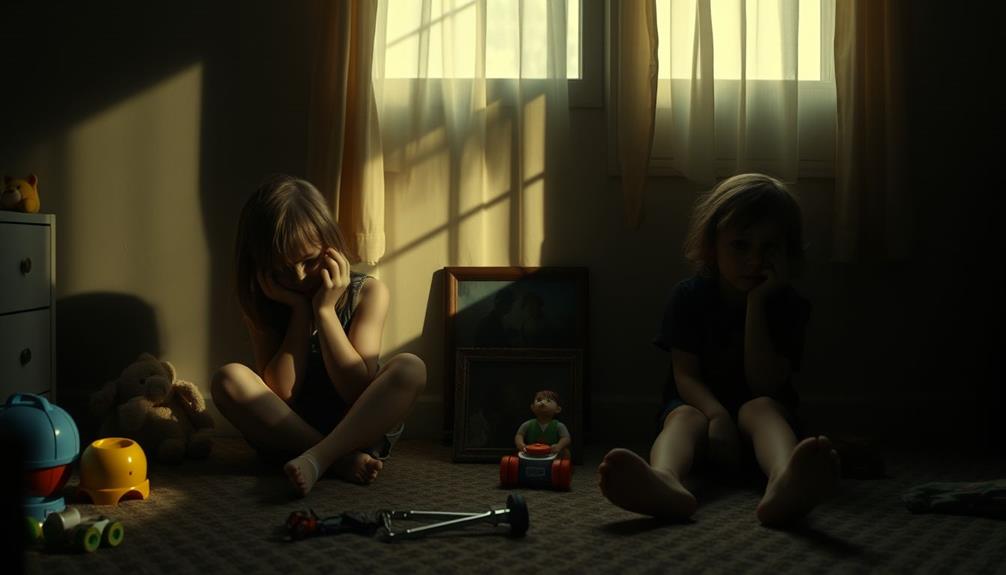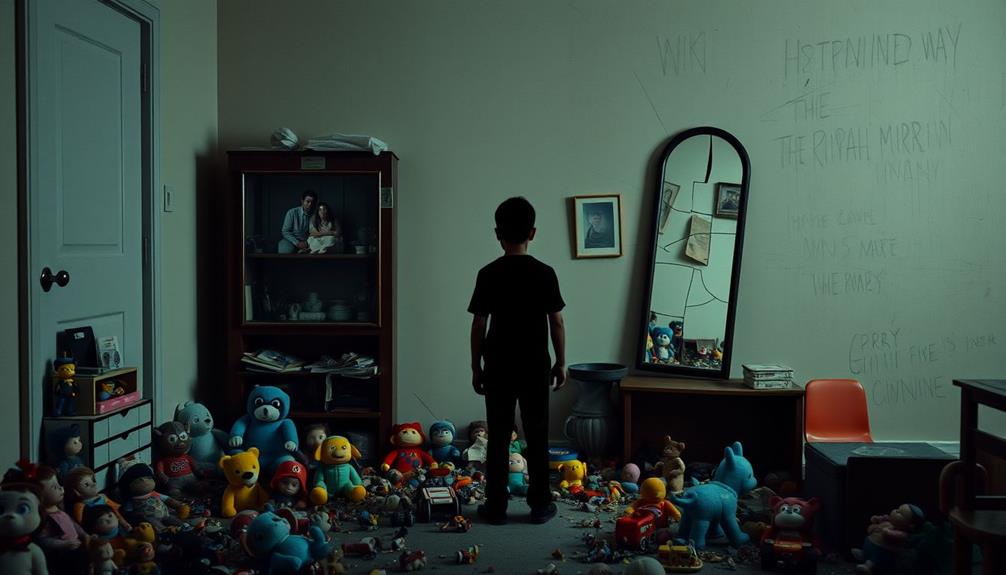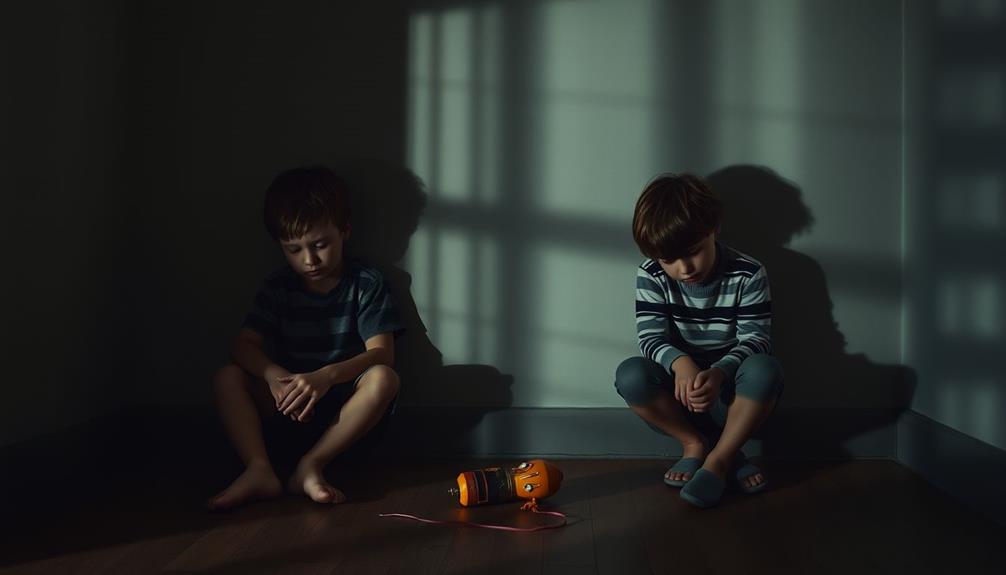Growing up with a sibling who has Borderline Personality Disorder (BPD) can be overwhelming. You might feel anxious, neglected, and emotionally drained due to the constant turmoil at home. The emotional burden often leads to feelings of guilt and responsibility, creating tension in your relationships. Your own personal development may suffer, hindering your self-esteem and emotional growth. Establishing boundaries and practicing self-care can help manage your mental health. Awareness and support are essential to feel understood and validated. By exploring this topic further, you can uncover strategies to empower yourself and navigate the complexities of these relationships.
Key Takeaways
- Siblings of individuals with BPD often experience emotional distress, including anxiety, depression, and feelings of neglect due to the sibling's behavior.
- Approximately 70% of siblings report feeling neglected, impacting their emotional stability and overall personal development.
- Growing up in a BPD household can hinder emotional growth, self-esteem, and lead to maladaptive coping mechanisms, affecting adult relationships.
- Establishing clear boundaries and engaging in self-care practices are essential coping strategies for siblings to maintain emotional health.
- Siblings often feel isolated and misunderstood, highlighting the need for support and awareness in addressing their unique challenges.
Emotional Burden on Siblings

The emotional burden on siblings of individuals with Borderline Personality Disorder (BPD) can be overwhelming and complex. You may find yourself grappling with heightened emotional distress, including anxiety and depression, stemming from your sibling's unpredictable behaviors.
Research shows that around 70% of siblings report feelings of neglect, contributing to emotional instability and an ongoing sense of turmoil in your life. This situation can be exacerbated by the impact of emotional dysregulation typical of BPD, leading to further complications in family dynamics.
This emotional strain can lead to maladaptive coping mechanisms, such as increased aggression or difficulties in forming healthy relationships. You might even notice symptoms of PTSD or complex PTSD emerging as a direct result of your experiences.
The chaos surrounding your sibling can create an environment where your mental health suffers, making it difficult to focus on your own needs.
Adding to the pressure, feelings of guilt or responsibility for your sibling's well-being can lead to chronic stress and emotional exhaustion. You may feel torn between supporting your sibling and safeguarding your own mental health.
Recognizing and addressing these emotional burdens is essential for your well-being, as they can profoundly impact your life and relationships long-term.
Effects on Personal Development

Growing up in a household affected by Borderline Personality Disorder (BPD) can profoundly influence your personal development. As a sibling, you might find yourself grappling with emotional dysregulation, which can complicate your own emotional growth. The unstable environment often breeds anxiety and depression, impacting your self-esteem and social interactions.
You're likely to feel neglected or emotionally unavailable as your parents focus on the needs of your sibling with BPD, leading to feelings of inadequacy and abandonment. Additionally, understanding the impact of other stressors, such as health issues and social dynamics, can further complicate emotional responses in a family setting, making it vital to navigate these challenges effectively. This is similar to how cold medications can affect emotional well-being by causing side effects that may exacerbate underlying mental health conditions.
These experiences can hinder your ability to form stable, trusting relationships in adulthood. You may adopt maladaptive coping strategies, like avoidance or aggression, to navigate the emotional volatility around you. Over time, these patterns can escalate into mental health issues, making it difficult for you to cope effectively with stressors.
The effects of BPD on personal development often linger, with lingering challenges in emotional regulation and relationship-building. Recognizing these impacts can be the first step toward healing, allowing you to develop healthier coping mechanisms and improve your emotional well-being.
It's important to prioritize your mental health and seek support, as your personal development matters too.
Relationship Dynamics and Challenges

Maneuvering the relationship dynamics with a sibling who's Borderline Personality Disorder (BPD) can feel like walking a tightrope, balancing your own emotional needs with the volatile nature of their behaviors. You might experience significant emotional distress, as their emotional instability often leads to anxiety and fear of conflict.
This constant tension can strain your relationship, making it difficult to maintain healthy boundaries. It's vital to reflect on the impact of caregiving on your mental health, as support resources for caregivers can provide guidance and assistance.
As you navigate these challenges, you may find yourself oscillating between feelings of loyalty and resentment. When you feel responsible for your sibling's emotional well-being, it can lead to your own mental health issues, such as anxiety and depression.
The impulsive behaviors displayed by your sibling can exacerbate communication breakdowns, resulting in misunderstandings that leave you feeling isolated and helpless.
This environment may hinder your social development, as the focus often shifts to managing their crises rather than fostering your own growth.
Ultimately, the relationship dynamics can create a cycle of emotional distress that impacts both your well-being and the overall sibling bond. Understanding these challenges is vital in recognizing the toll BPD takes on siblings, often leaving them as overlooked victims in this complex emotional landscape.
Coping Strategies for Siblings

Maneuvering life as a sibling of someone with Borderline Personality Disorder (BPD) requires effective coping strategies to protect your emotional health. You may face emotional distress, including feelings of neglect and anxiety, due to your sibling's unpredictable behavior.
Establishing clear boundaries is essential; it allows you to maintain a relationship without sacrificing your well-being. Incorporating practices such as mindfulness practices can help reduce emotional eating and foster a more balanced emotional state.
Engaging in self-care practices like mindfulness, exercise, and pursuing personal interests can greatly alleviate stress and enhance your emotional resilience.
Consider joining support groups or seeking therapy, where you can share experiences and validate your feelings with others who understand your journey. These spaces often provide valuable coping mechanisms tailored to the unique relationship challenges you face.
Understanding BPD and its symptoms can foster empathy, helping you view your sibling's behavior through a more compassionate lens. This knowledge may also reduce feelings of personal blame that often arise in these complex relationships.
Need for Support and Awareness

Steering through the complexities of having a sibling with Borderline Personality Disorder (BPD) often leaves you feeling overwhelmed and isolated. You might experience emotional neglect, which can exacerbate anxiety and depression.
It's crucial to recognize that you're not alone and that support and awareness are essential for your mental health. Additionally, maintaining a budget can help alleviate some financial stress that may arise from caregiving responsibilities, allowing you to focus on your emotional needs.
Understanding the necessity of creating a personal budget may provide a sense of control in an otherwise chaotic situation.
To navigate this challenging situation, consider these steps:
- Educate Yourself: Understanding BPD can demystify your sibling's behaviors and reduce feelings of confusion.
- Seek Support Resources: Look for groups or counseling specifically for siblings of individuals with BPD to share experiences and coping strategies.
- Prioritize Your Needs: Remember that your emotional well-being is just as important. Don't hesitate to set boundaries.
- Communicate Openly: Talk about your feelings with family members to improve family dynamics and alleviate the burden of responsibility.
Conclusion
In the shadow of a sibling with BPD, you often bear an emotional weight that can feel like a storm cloud hanging over your life. It's essential to recognize your struggles and seek support, as your well-being matters too. Just as a tree needs sunlight to grow, you need understanding and care to flourish. By raising awareness and sharing your experiences, you can help break the silence and make certain that siblings aren't overlooked in the conversation.









